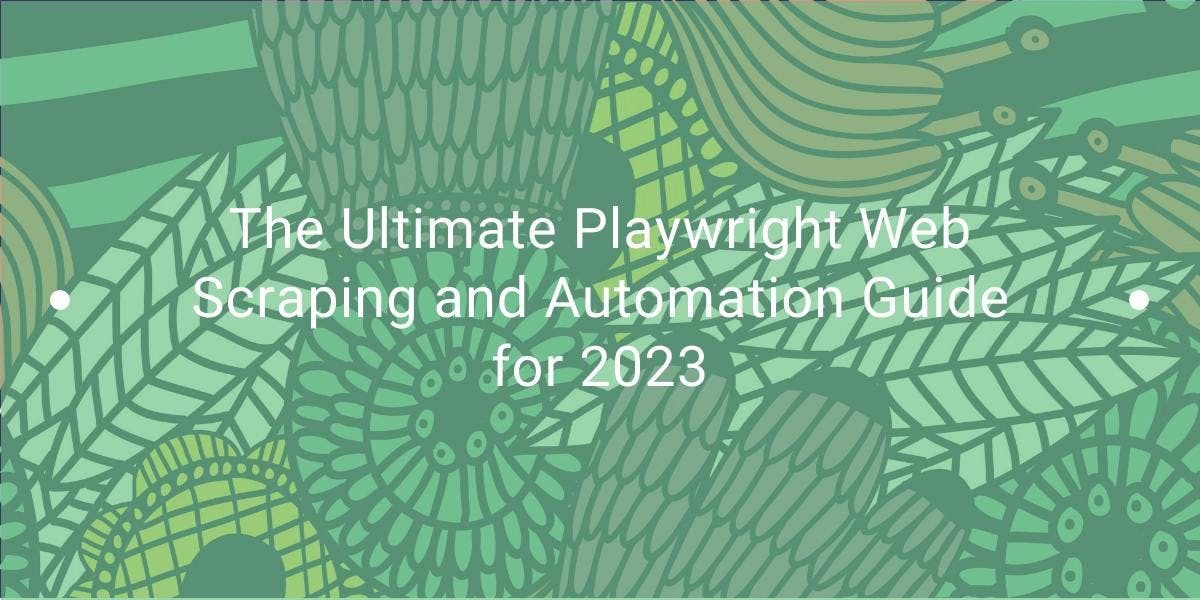The Beginner’s Guide to Using Proxies For Web Scraping
Raluca Penciuc on Apr 27 2021
While web scrapers don’t inherently need proxies to work, you’ll find that you can’t get very far without them.
No matter how careful you are and how much you limit or randomize the request rate, you’ll sooner or later end up blocked. And consider this — by slowing down your requests, you’re losing more time. Wouldn’t it be better just to get a few proxies, cycle through them, and finish your project before the heat death of the universe?
That's what we think, at least.
Anyway, not all proxies are the same. Prices differ, speed differs, and even functionalities differ. In this article, we set out to look at those differences and learn how to choose the right proxies for any project. Shall we?
Proxies — the bread and butter of web scraping
Let’s start with a definition. When accessing something over the Internet (for example, websites or apps), your IP address, a unique identifier on the Internet, is visible. Proxies are middlemen between you and the desired server that mask your IP (as well as other identifiers) to the website by submitting their own.
So, in short, proxies help you disguise your digital footprint. Next, why is that necessary for web scraping?
More often than not, you’ll want to extract data from several pages from the same website. Modern scrapers can do that in the blink of an eye, but actual humans can’t. Websites hope to be visited by actual humans, not robots, so when they detect robots, they might block them.
More advanced websites have extra security measures to discourage bots. They might preemptively ban known proxy IPs, make their HTML harder to understand, or use complex CAPTCHA functionalities.
With these known blockers, getting the data you want is a matter of using the right proxies in the right way. There are plenty of ways to catalog proxies by their anonymity or origin, but we’ll only talk about the two most important types for web scraping: datacenter and residential proxies.
Datacenter proxies
While a normal IP would be connected to an Internet service provider, just like any regular web user, datacenter proxies are stored en masse on a cloud server hosted by a third party.
In simple terms, one large server hosts thousands upon thousands of datacenter proxies. Additionally, the enterprise-level infrastructure makes datacenter proxies both stable and fast, at least the paid ones do.
You might find datacenter proxies only free for anyone to use. While in some cases, these may work as advertised, you might also be opening yourself to hackers so thread with care. Also, since it’s free to anyone, who knows what others used the IPs for, so they may already be banned on many websites. As the old adage goes, you get what you paid for.
The abundance is nice, but it also means that all those IP share a subnet which is less nice. The reason is simple — they have something in common, which makes it easy for websites to detect all of them once they find one.
Datacenter proxy advantages
First of all, it’s the price. While costs vary among different service providers, the general rule of thumb is that you’ll find datacenter proxies at better prices than residential proxies, which we’ll get to soon.
As we said when introducing the proxy type, they’re built on good technological foundations, so you can expect excellent stability and some of the best speeds a proxy can offer. The difference between 0.5 seconds and 0.9 might not seem large, but it adds up when you’re making thousands of requests each day.
Another advantage of relying on top-of-the-line servers is that your requests are routed through the closest proxies by default, further enhancing speed. The Internet may be fast, but if you’re in Los Angeles and the page you’re scraping is hosted in the US too, it’s better to route through a proxy hosted on the west coast, not the Ivory Coast.
Datacenter proxy disadvantages
Since they’re not hosted by any ISP, datacenter proxies don’t share real IPs, kinda. The problem is that they share a subnet, a common element which makes it easy for websites to detect all of them once it found one.
While datacenter proxies are geared towards speed, they lose a few points when it comes to imitating real users. That can be a problem since you’re more likely to run into blocks while extracting data. A large volume of proxies can fix or at least mitigate that, but remember that more proxies mean more costs.
When to use datacenter proxies
These types of IPs work well for your run-of-the-mill website. If you’re not facing serious scraping countermeasures, the proxies are a cost-effective solution to extract data without risking your own IP getting blocked.
If you’re scraping the same pages on a regular basis, and you know that datacenter proxies are a good fit, you can automate the process and rest assured that you’re getting the needed data without breaking the bank.
Residential proxies
These kinds of IPs are what both humans and computers would associate more with regular web users. The proxy is hosted by an ISP and has a real location. In that sense, it does the best job at masking your real IP, the whole point of proxies after all.
While the proxy service provider doesn’t have to maintain a large server that hosts countless IPs, they do have to find and incorporate plenty of residential proxies, all in different locations. That’s actually good for you, the user, since it generally means that you’ll have access to plenty of different geolocation options to bypass regional content restrictions.
Residential proxy advantages
First of all, residential IPs are the best of the best at not getting detected and subsequently blocked. For some, that’s the most important factor. With a decent pool of residential proxies, you’ll be able to scrape just about anything. Just make sure you’re doing it ethically!
Another point in their favor is the fact that most service providers will have proxies spread out in many countries, meaning that you don’t have to worry about geo-restrictions. It also makes it more likely that you’ll have a proxy close to where the web page is hosted so that requests don’t take long.
Unlike datacenter IPs which can get blocked en masse, all residential IPs are unique. You’re much less likely to find yourself blocked from the start since there’s no way to link any residential IP to another, even if you use both.
Residential proxy disadvantages
Due to the difficulty of creating a large pool of residential proxies and their effectiveness, you’ll most likely find them to be more expensive than datacenter IPs. The difference may not be very large but, again, it adds up when you’re making plenty of requests each day.
Since you’ll be working with IPs from many different locations and Internet service providers, speed may vary, from proxy to proxy, and from request to request. Finding the right provider with the most reliable and fast services is a must.
When to use residential proxies
This type of IP is considered by many the best option for web scraping. It has its costs, but residential IPs work on just about any web page.
Sites like Google, Amazon, or social media platforms take bots very seriously, so it’s very likely that datacenter IPs won’t cut it. That’s when you have to bust out the residential IPs, which have a much better chance to get you the data you need.
Taking it to the next level — Rotating proxies
With a proxy, you don’t have to worry about your actual IP getting blocked, but you may still be limited in how many requests you can send if you only use one proxy.
Then, the next logical step is to send requests from different proxies, so that the website sees different users accessing its pages. Smart right? But the problem now is that you have to manually switch the IP, so any time you gain by sending requests faster is lost by tying in the parameters of the request.
Still, web scrapers are all about automating tedious works, so why not automate the process of switching proxies? We’d like to introduce you to the concept of rotating proxies.
The idea of rotating proxies is for the service provider to use a feature so that whenever you make a request to a web page, it goes through a different IP each time. It’s the same as manually switching proxies, but without all the hassle, meaning that you can send thousands of requests with no delay and not fear getting blocked.
In certain cases, you’ll want to keep the same IP for consecutive sessions, if you have to log in to the website, for example. In that case, you just have to set sticky sessions in which you always use the same IP for the specified pages.
In short, rotating proxies are the cherry on top of a good proxy pool that ensures you get all the data you need on time and without getting blocked.
So, where do I get them?
There are plenty of proxy service providers out there. Most are geared more towards anonymous browsing, since that’s kind of the point of proxies. But there are other businesses geared more towards web scraping. In fact, some data extraction products, WebScrapingAPI included, come with their own pool of rotating proxies for the users’ convenience.
At this point, you’re ready to find a service provider that can help you with your projects, so go out there and look at your options! Here’s a good list of products to start on.
News and updates
Stay up-to-date with the latest web scraping guides and news by subscribing to our newsletter.
We care about the protection of your data. Read our Privacy Policy.

Related articles

Learn how to use Playwright for web scraping and automation with our comprehensive guide. From basic setup to advanced techniques, this guide covers it all.


A reliable proxy pool is just the first step towards web scraping greatness. The next one is rotating those proxies. Here's what you need to know!


Proxy selection is a major step in any web scraping project. Today, we'll compare dedicated and shared IPs and propose some providers for you.
